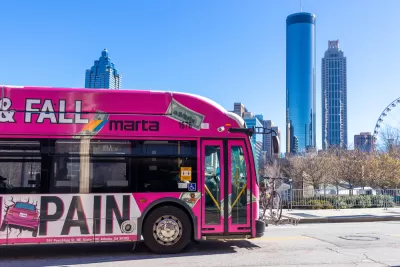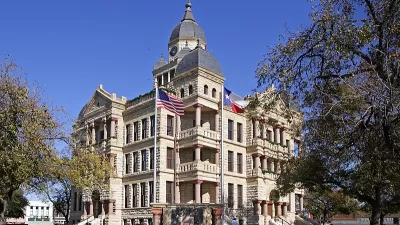From small rural towns to metro Atlanta, Georgia communities are experimenting with on-demand transit to improve connections to existing transit and offer transportation to isolated communities.

“In the past 18 months, on-demand transit has launched across Georgia, from Atlanta to Valdosta to Gainesville,” writes John Ruch. “Advocates and critics differ on the details while agreeing on-demand has its place and its unknowns.”
“Providing fast, low-cost service for last-mile connectivity and other short trips has been difficult and it limits the appeal of transit as a mode of travel. If we can solve that problem with services like the Buc and MARTA Reach, we can make it much easier for people to choose transit,” said Jim Durrett, executive director of the Buckhead Community Improvement District (CID), which funded the Buc shuttle in that neighborhood.
Critics say on-demand transit is “inherently far less efficient than fixed-route buses,” making it “best suited to small-town, rural and suburban-sprawl areas” as an option for hard-to-reach areas with few other transit options. This is exactly how several small Georgia communities, such as Valdosta and Hall County, are using it. In a much larger city, Atlanta’s MARTA is exploring microtransit as a solution for other goals. “In metro Atlanta, two new on-demand programs are aimed at ‘last-mile connectivity’ for fixed-route transit riders, with the implication of boosting overall transit ridership.”
The next six months, writes Ruch, should provide a clearer picture of how effective on-demand transit programs will be in increasing ridership and bringing transit access to more Georgians.
FULL STORY: On-demand transit expands across Georgia, putting pitches and criticisms to the test

Trump Administration Could Effectively End Housing Voucher Program
Federal officials are eyeing major cuts to the Section 8 program that helps millions of low-income households pay rent.

Planetizen Federal Action Tracker
A weekly monitor of how Trump’s orders and actions are impacting planners and planning in America.

Ken Jennings Launches Transit Web Series
The Jeopardy champ wants you to ride public transit.

California Invests Additional $5M in Electric School Buses
The state wants to electrify all of its school bus fleets by 2035.

Austin Launches $2M Homelessness Prevention Fund
A new grant program from the city’s Homeless Strategy Office will fund rental assistance and supportive services.

Alabama School Forestry Initiative Brings Trees to Schoolyards
Trees can improve physical and mental health for students and commnity members.
Urban Design for Planners 1: Software Tools
This six-course series explores essential urban design concepts using open source software and equips planners with the tools they need to participate fully in the urban design process.
Planning for Universal Design
Learn the tools for implementing Universal Design in planning regulations.
Ada County Highway District
Clanton & Associates, Inc.
Jessamine County Fiscal Court
Institute for Housing and Urban Development Studies (IHS)
City of Grandview
Harvard GSD Executive Education
Toledo-Lucas County Plan Commissions
Salt Lake City
NYU Wagner Graduate School of Public Service





























